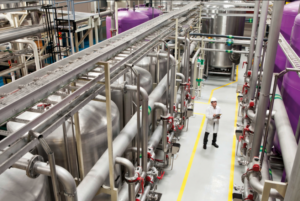
Enzymatic plastic eaters
For a long time, scientists have been searching for enzymes that can degrade commodity plastics such as Polyurethanes or poly-vinyl chloride (PVC). German-US company Covestro AG and researchers at University of Greifswald now say that they have found new enzymes that could do the job.
Researchers from Germany and Ireland together with Covestro AG (Leverkusen) have developed chemo-enzymatic processes that degrade polyurethanes (PUR) and polyvinyl alcohol (PVA), a main compound in industrial wastewater (doi: 10.1002/anie.202216220, 10.1002/anie.202216962). According to the consortium headed by Uwe Bornscheuer from University Greifswald it is a sustainable and environmentally-friendly process to recycle these polymers. The two synthetic polymers are produced industrially at large scale and contribute to about 8% of the European plastic production. Only 12 enzymes have been described for PUR degradation but so far they worked incredibly slow and inefficent.
Polyurethanes are used for the production of mattresses, insulating materials, thermoplasts such as sports shoes and for coatings such as sealants, paintings and glues. In contrast to chemical degradation methods, which require a lot of energy in the form of high temperatures and high pressure, the biotech process runs at no more than 40°C and without the use of chemical reagents whereas the chemical glycolysis step runs at relatively moderate 200° C.
PUR depolymerisation
The researchers now identified a key enzyme, which degrade polyurethane into its building blocks after chemical pretreatment. The search for these specific biocatalysts was very laborious as we had to screen about two million candidates in order to discover the first three enzymes, which have been proven to break the special chemical bond present in polyurethanes, said first author Yannick Branson. The researchers screened a metagenome library from soil and discovered urethanases that can hydrolyse a broad range of industrially relevant dicarbamates resulting from chemical glycolysis of polyether-polyurethanes.
With this ground-breaking discovery we now have the precondition to tailor-design these biocatalysts using methods of protein engineering that aim to develop an industrial recycling of polyurethanes, stressed Bornscheuer. Using these newly identified enzymes, we get much closer to our target of a circular economy for the polymer industry, commented Gernot Jäger, head of the Competence Center for Biotechnology at Covestro AG.
Polyvinyl alcohols (PVA) are also widely applied, for instance ine coating of fibers and as foils for packaging. Since the biodegradability of PVA is low and so far involved costly pyrroloquinoline quinone (PQQ)-dependent enzymes, a large amount of the polymer is released into wastewater.
Three enzymes crack PVA
Bornscheuer’s team designed basic principles for a biotech process together with a polymer expert from the University College Dublin (Ireland) and scientists from Leipzig that involves chemical succinylation and a combination of three different enzymes – a commercial lipase TL-IM, LK-ADHplus NADP+ as a cofactor, and CHMO M15 – that can be recombinantly expressed in E. coli. The fragments obtained can be used for PVA recycling.


 Carbios SA
Carbios SA
